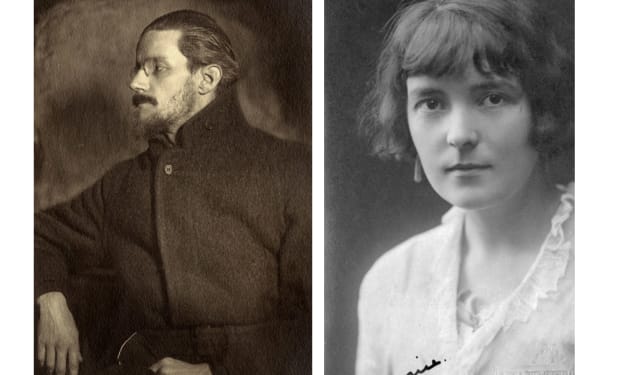The Significance of Theme in Fleur
A Short Story by Louise Erdrich

Louise Erdrich has several important themes that are wound together through this story very well. It deals with Indian culture and spiritualism, man's view of women's place in the world, and women's growing resentment at being locked into a particular place.
The two main characters Fleur and Pauline both have Indian blood and some knowledge of their culture. As Indians in a world where the predominant culture is white European, they are very familiar with their two great choices in life: isolation or assimilation. They have suffered death, disease, loss of culture and religion, and forced assimilation.
Even so, they know a little about their own Indian background. They both know that in their world Religion is not separate or apart from living, it's actually a way of living. Religion or God is in everything, around everything. Everything that exists is alive, provided by Mother Nature and Father Sky. Everything can be used, but must be used with only the utmost respect.
Indian life was matriarchal, women-centered. Women made up and advised the wise councils, and then the various tribes. They had a vast storage of knowledge that was lost when white man entered the picture. This great culture clash nearly destroyed the Indians and totally re-invented some of their past history.
It is Fleur that brings magic and mysticism into the story. She is a young, somewhat isolated woman who drowns as a child. Indians have special feelings for the near-death experience that she went through. They understand that those who walk among the land of the dead and return to the living have very special destinies in life.
Some return with special powers, and some return for a particular purpose.
The story doesn't say why Fleur keeps travelling between both worlds through her drowning episodes, but she seems to be following a specific path.
Those given such a path usually follow the path through their life without hesitation, sometimes at the cost of their own lives. Some times the path itself becomes more important than the act of living.
Perhaps Fleur's journeys between worlds have to do with "old magic," "medicine half-forgotten." Or maybe her drowning is a link to some of the forgotten wisdom of the Ancient Ones, who are very important in Indian History and culture.
For whatever reason, her drowning makes her out of bounds, isolated as a human being. She's connected to too many things that are not often understood. She is described by other members of the reservation as "haywire." She is "out of control." She "messes with evil,” and she "laughed at the old women's advice." She "studies ways we shouldn't talk about."
Along with what they know about Fleur, are many rumors about her that heighten the fear surrounding her, and isolated her even more. Some say that she "kept the finger of a child in her pocket."
She carried "the powder of unborn rabbits in a leather thong around her neck."
She put "the heart of an owl on her tongue so she could see at night." She went hunting "out of her body." There are also many references to shape changing in the story. Fleur is rumored to change into animal shapes at will.
This all seems to add up to the possibility that Fleur was practicing the arts of a medicine woman, a woman of great power.
Fleur takes all this background and uses it to challenge men on their own level. She smokes, drinks, gambles, works, and physically fights with men. Because she challenges men on their level, she can't be considered a normal woman. If she is seen as normal, and defeats men, she upsets the male view of status quo.
She encourages other women to try some of the same things she is doing. In order to support a male viewpoint, Fleur has to have some super normal power. She does. Her power comes from water. She drowns men, but it's not the act of drowning that gives her personal power.
That power comes from water. Feminist circles say that because water is part of the cycle of life, and women have the power to give birth, all women are keyed into this power. Fleur has learned how to recognize it and use it.
A women-centered viewpoint might suggest that this story highlights the conflict between men's view of women's place in the world, and women's resentment to being locked into that place.
While Fleur represents the woman of power, Pauline is the invisible woman, the long thin shadow on the wall. She fits into men's view of women, but she also personally picks this path. The invisibility works for her. It removes her from the eyes of men. She is well out of their line of rage. She moves safely through life while Fleur is a much more visible target who takes all the guff.
The story follows Fleur and Pauline through a confrontation with men, (through a poker game); an attack; a physical fight, and Fleur's escape. Later, a horrendous storm hits the town of Argus and destroys the men who attack Fleur. Did she cause the storm, or was it an act of nature? In the end it doesn't matter.
The big thing is that Fleur and Pauline are alive and well at the end of the story. Fleur is still practicing her medicine, and living her somewhat isolated life.
The big change is in Pauline. She isn't a bra-burning, card carrying member of NOW, but she's not the invisible woman that she was at the beginning of the story.
Fleur's surviving of this experience is a very feminist woman-centered point of view. If this story had been written by a man, or a woman steeped in the male view of women's place in the world, Fleur would still be mystical, but she would be some hideous monster with only the most negative aspects possible.
There could only be one possible outcome: Fleur would have to die by the end of the story. Because of her connection to water, she would probably drown. Because she chooses to challenge men, her death would probably be at the hands of a man, maybe held face-down in a pool of muddy water or something similar.
This story would then be yet another male justified view of women's place in the world. Instead, Fleur beats men at their own games, and still walks away. Pauline steps out
of place, and becomes less invisible, and more of herself for knowing Fleur. She finds strength in other women, and more personal power for herself without having to step out of character; to be something that she really isn’t capable of being or becoming.
About the Creator
CL Robinson
I love history and literature. My posts will contain notes on entertainment. Since 2014 I've been writing online content, , and stories about women. I am also a family care-giver.
Enjoyed the story? Support the Creator.
Subscribe for free to receive all their stories in your feed. You could also pledge your support or give them a one-off tip, letting them know you appreciate their work.






Comments
There are no comments for this story
Be the first to respond and start the conversation.